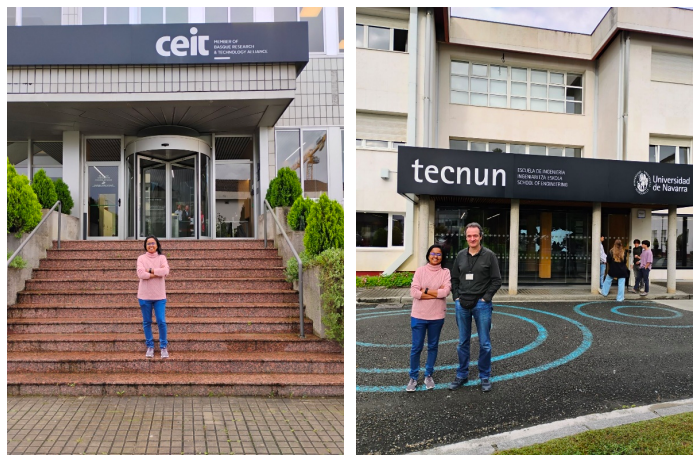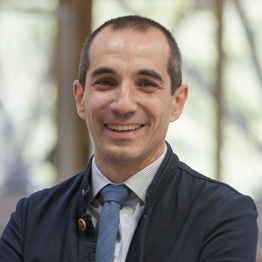Building Integrated Thermoelectric System (BITES)
An environmentally friendly approach for self-heating and cooling in buildings
Shaping the future of energy-efficient, climate-resilient buildings
Buildings are major contributors to global energy use and carbon emissions, making them a key focus of sustainable energy strategies. The Building Integrated Thermoelectric System (BITES) is an innovative solution that uses thermoelectric technology for heating, cooling, and ventilation. Thermoelectrics convert heat in electricity (Seebeck & Peltier effects), offering silent, reliable, low-maintenance operation without moving parts.
The project, which is focused on exploring the possibilities of thermoelectric technology for developing smart buildings as an environmentally friendly approach for self-heating and cooling in buildings. The aim is to integrate these thermoelectric modules into building envelopes and work in combination with solar photovoltaic panels to create a hybrid energy-harvesting system and tackle renewable energy technology to provide self-heating, air conditioning and ventilation systems within buildings.

*Building Integrated Thermoelectric System (BITES) is a project funded by the European Union HORIZON-MSCA-2024. This is a two-year research and innovation programme under the Marie Skłodowska-Curie Actions (MSCA) grant agreement ID: 101208430.

Objectives

Custom Design and Integration of Efficient Thermoelectric System and Advanced hybrid technology.

Explore the possibilities of nanostructured and high-ZT (figure of merit) thermoelectric materials and system designs for the development of smart buildings.

Bring together a multidisciplinary team of experts to shape the future of sustainable building technologies.

Work with different institutions to transform thermoelectric innovations into real-world solutions.
Team
RESHMA KRISHNAN MADATHIL
Principal Investigator
Marie Skłodowska-Curie Actions (MSCA) Postdoctoral Fellow at Universidad de Navarra, Spain.
She obtained her PhD in thermoelectric from the Centre for Materials Science and Nanotechnology (SMN),University of Oslo, Norway. Her research interests are in thermoelectric technology, various fabrication techniques for thermoelectric devices.
CÉSAR MARTÍN-GÓMEZ
Project Supervisor
Professor in the Department of Construction, Building Services, and Structures at the Universidad de Navarra, Spain.
He has been working since 2001 on projects involving the integration of building services and energy systems in complex architecture. He is an expert in the research fields of building services, energy technology integration, and architecture.
Welcome to the BITES Team!
We are delighted to welcome Juan Rigo Salas and Amaya Acarregui Padilla as TFG students under the BITES project for the academic year 2025–2026. Juan will be exploring thermoelectric integration in transparent envelopes and active glazing systems, while Amaya will be investigating the barriers, possibilities, and design frameworks for thermoelectric building integration. We look forward to their contributions to the project!
JUAN RIGO SALAS
Final Degree Project Student Active Glazing Systems: Thermoelectric Integration in Transparent Envelopes
Juan Rigo Salas is a final-year Architecture student at the School of Architecture, Universidad de Navarra. His degree project focuses on the integration of thermoelectric technology into transparent building envelopes, exploring active glazing systems as a pathway toward energy-responsive facades. Through the BITES project, he investigates the technical and architectural possibilities of embedding thermoelectric modules within windows and other facade systems.
AMAYA ACARREGUI PADILLA
Final Degree Project Student Thermoelectric Building Integration: Barriers, Possibilities, and Design Frameworks
Amaya Acarregui Padilla is a final-year Architecture student at the School of Architecture, Universidad de Navarra. Her degree project examines the current landscape of building-integrated thermoelectrics from a broader design and regulatory perspective, identifying technical barriers, architectural opportunities, and potential frameworks for wider adoption. Her work within the BITES project contributes to understanding how thermoelectric systems can be translated into practical building design strategies.
Events/Last news
Strengthening the BITES project’s commitment to collaboration and knowledge exchange, Reshma Krishnan Madathil visited the University of Zaragoza. During the visit, she met with the Thermoelectric Research Group led by Dr. Andrés Sotelo Mieg, Research Director in the Area of Materials Science and Metallurgy. Dr. Sotelo is a leading figure in the development of oxide-based thermoelectric ceramics, and his team continues to make significant contributions to the field.
This visit provided valuable insights and has opened opportunities for future collaboration within the BITES project.
On 25/09/2025, as part of the BITES project’s collaboration and networking activities, Reshma Krishnan Madathil visited TECNUN, the School of Engineering of the University of Navarra, and the CEIT Research Centre in San Sebastián. The visit provided an excellent opportunity to explore their facilities, ongoing research, and innovative projects. Discussions with Jon Alkorta Barragan and Javier Aldazabal Mensa focused on how collaboration with TECNUN and CEIT could directly support the current research activities within the BITES project, while also identifying opportunities for future collaboration. This interaction not only enriched ongoing work but also strengthened professional networks, further advancing the objectives of the BITES project.

In line with the BITES project’s networking initiatives, on 09/09/2020 the BITES project team—Principal Investigator Dr. Reshma Krishnan Madathil and Project Supervisor Prof. César Martín-Gómez—visited Viguetas Navarra, an industry specialist in precast concrete solutions for residential construction, to discuss thermoelectricity and its applications in buildings. The visit included an explanation of thermoelectric technology and a discussion of our research on thermoelectrics for building applications with Luis Ilundain, CEO of Viguetas Navarra. This experience provided valuable insights for our research and highlighted potential avenues for industry collaboration, thereby strengthening the objectives of the BITES project.
Related News, Research & Events
-
Thermoelectric Brick with Solid–Solid Phase-Change Materials for building-integrated energy harvesting
Researchers designed a thermoelectric brick that embeds thermoelectric generators with solid–solid phase-change materials to harvest building waste heat and convert it into electricity. Simulations across different global climates show continuous power generation sufficient to support low-power devices, highlighting its potential for self-powered sustainable buildings.
👉 https://www.sciencedirect.com/science/article/pii/S1359431125034362
-
Bio-Inspired Thermoelectric Cement for Self-Powered Buildings
This study introduces a bio-inspired cement-PVA composite that greatly enhances ionic thermoelectric performance by creating aligned ion pathways and selective interfaces. The material exhibits a substantially higher Seebeck coefficient and can be used to build self-powered architectural elements, moving toward thermoelectric-enabled infrastructure.
👉 https://www.sciencedirect.com/science/article/pii/S2095927325002816
-
Nano-Engineered Thin-Film Thermoelectric Materials Enable Practical Solid-State Refrigeration
This Nature Communications study demonstrates nano-engineered thin-film thermoelectric materials that significantly improve performance over conventional bulk thermoelectrics, achieving much higher figures of merit (ZT) and solid-state refrigeration performance using scalable thin-film modules. The technology shows potential for compact, efficient cooling and electronics thermal management without conventional refrigerants — a major advance for thermoelectric devices in real-world systems.
👉 https://www.nature.com/articles/s41467-025-59698-y
-
Patent: Facade System for Thermally Conditioning Buildings
This 2025 U.S. patent describes an innovative building façade system incorporating a grid of thermoelectric components (TECs) within wall panels to provide localized radiant heating and cooling without traditional HVAC equipment. The panel structure is thermally coupled to a building’s exterior surface, enabling active thermal conditioning and energy harvesting directly from the façade — a significant step toward smart, energy-efficient building envelopes.
-
Next-Gen Thermoelectric Cooling Wins 2025 R&D 100 Award
The Johns Hopkins Applied Physics Laboratory (APL) received a 2025 R&D 100 Award for its nano-engineered thermoelectric refrigeration technology, which uses CHESS materials to deliver up to ~70% better cooling performance compared with bulk thermoelectrics — a key step toward more efficient, solid-state cooling systems for future HVAC and building applications.
👉 https://www.jhuapl.edu/news/news-releases/250821-apl-refrigeration-tech-wins-rd-100-award-2025
-
Compressor-Free Cooling with Nano-Engineered Thermoelectrics
APL researchers, together with Samsung Research, demonstrated scalable solid-state cooling using nano-engineered thermoelectric materials that significantly improve heat-pumping efficiency without traditional compressors — pointing toward energy-efficient refrigeration and cooling technologies for buildings and electronics.
👉 https://www.jhuapl.edu/news/news-releases/250521-apl-thermoelectrics-enable-compressor-free-cooling
-
Hidden Energy in Building Facades Powers Smart Sensors
A thermoelectric energy-harvesting system developed by TEGnology uses natural temperature differences across building façades to generate electricity and power autonomous sensor networks without batteries or wiring. This enables long-lasting, maintenance-free monitoring of structural and environmental conditions in modern buildings.
-
Thermoelectric Generator Market Set for Strong Growth
A market report from Mordor Intelligence forecasts robust growth in the global thermoelectric generator market, with wearable and consumer electronic applications expanding rapidly and projected ~13.6% CAGR through 2030. This trend reflects broader interest in energy harvesting and integrated thermoelectric solutions across sectors including building sensors and IoT.
-
ICT 2026 – Houston, TX, USA — 42nd International Conference on Thermoelectrics-May 17–21, 2026
The premier global event on thermoelectric research and applications will showcase advances in materials, modules, and system-level integration including thermal management and energy conversion strategies.



